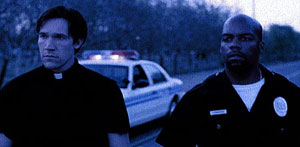

Mercy Streets is by the same company that dropped The Omega Code upon the world. That said, Mercy Streets is much better than The Omega Code, but that is not really saying anything at all. Years ago, contemporary Christian musicians debated music quality versus lyric quality. Some said that all their songs should glorify God to the point where the quality of the music suffered. The lyrics were indeed good, it was just that the music sucked. In the intervening years, Christian artists learned how to craft good (well, relatively) music with equally good messages, much to the delight of their fans. They are now selling huge amounts of records, but still do not register on the radar of many non-Christians. Now it seems that Christian cinema may be where Christian music was ten years ago. These two films, along with the Mormon film God's Army do not really serve as great examples of their respective religions. They are made for their respective religions, and people will go watch them because they can finally see something they are told is good.
Mercy Streets suffers from having a ridiculous story. It revolves around twins John and Jeremiah (David White, The Assassins, The Moment After). John is fresh out of jail when his mentor Rome (Eric Roberts, La Cucaracha, Lansky) forces him again to return to a life of crime. Their plan revolves around scamming some people into believing they are buying a large amount of counterfeit money. John wants out, and tries to escape. He seeks out his brother Jeremiah, who lives a life diametrically different. Jeremiah is a minister, soon to be ordained, and has a steady girlfriend. John switches places with Jeremiah, while Rome captures Jeremiah. John quickly eases into his role as 'Jeremiah,' and now wants to scam Jeremiah's church out of money. Rome threatens to expose incriminating evidence against John to the police, leaving Jeremiah in a moral quandary; should he help Rome in a crime?
Although the production value is decent, most everything else is not. Director Jon Gunn and writer John W. Mann craft an easily predictable morality play. The good life will undoubtedly change John for the better. In order to make Jeremiah equally as compelling, Gunn and Mann make his character guilty over a past action. In his normal life, he is precise, anal-retentive, and orderly to the point of obsessiveness. This is wreaking havoc on his relationship with Sam (Cynthia Watros, Blink of an Eye). Yet he changes drastically after in Rome's hands. The fact that he contemplates abetting Rome does not show any personal weakness, it is a weakness of the script. Gunn probably wants to show that even priests have their flaws, but Jeremiah's flaws run contrary to everything else Gunn states. Gunn also blatantly uses one person from every race. They don't do anything, they just seem to be there to be there. The soundtrack is also distracting, with a mish-mash of songs that frequently play loudly over the action. The acting is pretty bad, especially on White's part, but this is partially due to the script.
Nevertheless, Gunn set out to make a film for Christians, and his intentions are earnest. There is no nudity, sex, or extreme violence here. There also is no language, although in some of the situations, it is laughable. Common street criminals are not known for the lack of the f-word in their vocabulary. Mercy Streets gets points for trying (not too successfully) to incorporate religion into the story. This was the largest failure of The Omega Code. There was nearly no mention of Christianity in that so-called "Christian" movie. Here, Gunn has characters pontificate about their religion to the point that many non-believers will find it annoying. Their comments about Christ come out of left field then disappear. Christians will enjoy this, but it just doesn't make any sense to others. Consider the movie Dogma. It was a really funny movie, and probably the most religiously profound in recent memory. Characters there set out to look for truth and Kevin Smith made their whole search evident (wrapped underneath wall-to-wall profanity). They questioned their beliefs and discussed their ideas, whereas Gunn merely has the characters preach to the audience. Gunn's characters go through the familiar changes at the end that give movies happy endings. Any personal growth experienced is not from knowledge learned but from the script itself. Gunn and other Christian filmmakers need to realize that if they want to make movies, they should make good movies. If a movie is well-acted and well-scripted, people will enjoy it regardless of its values. Mercy Streets is a step in the right direction, albeit a small step.